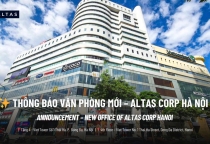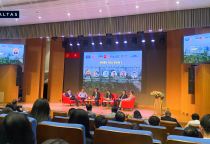Trade Agreements and FDI Flows in the Technology Sector: The Impact of EVFTA and RCEP on Investment Decisions
Views: 997
In the context of international economic integration, new-generation free trade agreements such as EVFTA (the EU-Vietnam Free Trade Agreement) and RCEP (the Regional Comprehensive Economic Partnership) have been significantly impacting foreign direct investment (FDI) flows into Vietnam, particularly in the technology sector.
.png)
EVFTA and RCEP Agreements and Their Impact on FDI in Technology
The EU-Vietnam Free Trade Agreement (EVFTA) and the Regional Comprehensive Economic Partnership (RCEP) have created new momentum for foreign direct investment (FDI) inflows into Vietnam, particularly in the technology sector.
EVFTA: Commitments to market liberalization and intellectual property protection under EVFTA have facilitated European technology firms’ investments in Vietnam. This not only enhances investment quality but also promotes technology transfer and strengthens the competitiveness of Vietnamese enterprises.
RCEP: By improving market access and facilitating exports among ASEAN members and partners, RCEP has contributed to the development of new supply chains in the region.
Notably, high-tech enterprises from Japan, South Korea, and China have increased their investments in Vietnam, enhancing the country’s production and export capabilities in the high-tech sector.
Key Factors Influencing Investment Decisions in the Technology Sector
FDI Attraction Policies: Legal regulations and government support policies play a crucial role in attracting investment. Key factors include tax incentives, intellectual property protection, and support for technology development.
Consumer Market: The size and growth potential of the consumer market are also important factors. Investors will consider the market expansion potential and consumer demand for technology products.
Technical Infrastructure: The development of technological infrastructure, including internet networks, databases, research centers, telecommunications, and digital transformation support policies, helps attract FDI into the technology sector.
Challenges and Prospects
Increased Competition: Market opening under EVFTA and RCEP has created fierce competition from foreign companies with strong financial capabilities and extensive experience. Domestic technology companies face significant pressure to improve product and service quality to maintain market share, which can also be seen as a breakthrough opportunity for local businesses.
Security and Cybersecurity Risks: The rapid development of technology comes with increasingly complex security and cybersecurity threats. Companies need to invest heavily in security solutions to protect their data and systems from cyberattacks.
Technology Transfer: EVFTA and RCEP facilitate technology transfer from developed countries to Vietnam. This helps enhance the production capacity and innovation of domestic enterprises, while also promoting the development of the high-tech sector.
Conclusion
Both EVFTA and RCEP offer significant opportunities for Vietnam in attracting FDI into the technology sector. However, to fully capitalize on the benefits of these agreements, Vietnam needs to continue improving the investment environment, enhancing the quality of human resources, and promoting innovation.
Written: Dang Thi Ngoc Lan - Legal Senior Assistant
Date: 14/02/2025














.png)











![?️ [ALTAS TALK IS COMEBACK | SERIES: “TAX MATTERS 2025”] ?️ [ALTAS TALK IS COMEBACK | SERIES: “TAX MATTERS 2025”]](thumbs/210x144x1/upload/news/altas-talkintro-7705.png)



